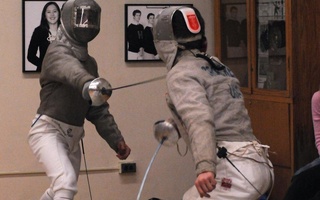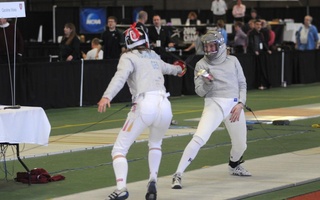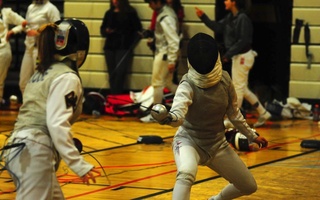
Freshman Alexander “Sasha” Ryjik will be following in his father’s footsteps as he takes to the international stage. But, unlike his father, Sasha will be sporting red, white and blue.
For many individuals here at Harvard and outside its gates, the mention of the sport of fencing is likely to conjure up images of Pirates of the Caribbean, swashbuckling pirates, high stake duels to defend honor between European nobles, and a masked fighter named Zorro. However, for Crimson freshman Alexander “Sasha” Ryjik, fencing is something greater than its modern media portrayal; it is a grueling sport “like a chess game and boxing match put together,” Ryjik said, that has become a defining part of his life.
As an early entrant into the sport, Ryjik, who began fencing at the age of eight, has nearly a full decade of training and experience under his belt—experience that has served him well on the national, club, and collegiate fencing circuits.
But this week, Ryjik will be given a unique opportunity that few student-athletes are ever given in their athletic careers: the opportunity to compete while wearing his nation’s colors at the international level. Ryjik will be representing the United States at the 2012 World Cadet and Junior Fencing Championships in Moscow, Russia.
As one of the premier events in international fencing, the Junior World Fencing Championships, is held every year in the spring and serves as the headline fencing competition for young fencers across the globe. Each year, approximately 1300 under-19 athletes from roughly 80 nations take part in the championships. Fencers are broken up into age groups: entrants between ages 17 and 19 form the junior class while those under 16 form the cadet class.
Having participated in two previous world championships in the cadet class, Ryjik this year will enter into the Junior World Championship for the chance to bring home international glory. But Ryjik’s international aspirations do not end with this year’s world championships in Moscow.
Historically, the Junior and Cadet World Championships have been instrumental in the rise of a number of future stars of international fencing. Amongst the alumni of the event are a number of Olympic and World Cup medalists.
And as an ambitious and already accomplished fencer himself, Ryjik hopes to do the same. Ryjik, the current number one fencer in the 19-and-under age group for the United States, sees his fencing career eventually passing through the sunny beaches of Rio de Janeiro.
“People often ask me if I’m going to make the Olympics,” Ryjik said. “I definitely can’t make the London Olympics this year, but I’m hoping to make the 2016 Olympic team in Rio.”
But even with a little over four years before the Rio games, Ryjik is firmly aware of the sacrifices involved in attaining Olympic glory.
“I still have a lot of decisions to make for [the Olympics], though,” Ryjik said. “I’ll probably have to take a year off from school in order to focus on making the Olympic team, so I’m not sure how everything will play out.”
Though the presence of an Olympic fencing aspirant on Harvard’s campus may come to many as a pleasant surprise, a quick look at Ryjik’s personal background and history reveals that in many ways his life story has been building up to a potential Olympic berth.
For Ryjik, fencing is not just a sport he casually stumbled into. Rather, it is a sport that runs deep in his veins. Sasha is the son of former Soviet national champion fencer Alexandre Ryjik.
“Those days were not the easiest days to be a Soviet athlete and he left Russia and came here in 1991, right after the fall of the Soviet Union,” Sasha said. “Today, my father is probably one of the most patriotic individuals [I know], to this country of course.”
However, Alexandre not only inspired his son to take up fencing, but also molded Sasha into the fencer that he is today. As Sasha related humorously, his father’s involvement in his fencing career was probably planned upon his birth but truly began at the age of eight, when he first picked up the sport.
“Although I’ve worked with several people ever since I started, including my current coach Peter Brand, my father has essentially been my permanent coach,” Sasha said.
Read more in Sports
Women's Lax Looks To Turn Year AroundRecommended Articles
-
Women Bounce Back To Win PairThe men's fencing team (8-5) finished its last day of matches with two wins, defeating Air Force, 17-10, and Haverford, 23-4, while the women also swept the same opponents, 24-3 and 21-6.
-
 LIVE BLOG: NCAA Fencing Championships
LIVE BLOG: NCAA Fencing Championships -
 Vloka Gets Back At Foe
Vloka Gets Back At Foe -
The Full-Court Press: Valentin Staller '12Meet junior Valentin Staller. As a Harvard fencer, Staller had never won an Ivy League championship. But last weekend Staller ...
-
 Fencing Delivers Strong Showing at Northeast Regional Championships
Fencing Delivers Strong Showing at Northeast Regional Championships -
Fencer Valentin Staller Finishes Second at NCAA ChampionshipsThe Harvard fencing team capped off its season with a sixth-place finish at the NCAA Championships over the weekend in Columbus, Ohio. Co-captain Valentin Staller was among six All-Americans for the Crimson and led the team with a second-place finish in the sabre.













